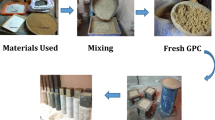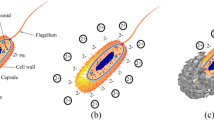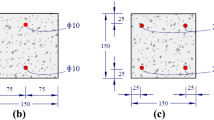Abstract
The effects of water/binder ratio (w/b) on the toughness behavior, compressive strength and flexural strength of engineered cementitious composites (ECC) were investigated. The w/b ratios of 0.25, 0.31, 0.33 and 0.37 were selected and the specimens were tested at the ages of 7 d and 28 d. The experimental results showed that there was a corresponding increase in first cracking strength, modulus of rupture, compressive strength and flexural strength with the decrease of w/b. Within the w/b range of 0.25–0.37, higher w/b was found to have improved effects on deflection, strain hardening index and toughness index of ECC. In the permission of meeting the requirement of compressive strength grade, selecting higher w/b in mix design will help to obtain robust ECC.
Similar content being viewed by others
References
Victor C Li. On Engineered Cementitious Composites (ECC)-A Review of the Material and Its Applications [J]. Advanced Concrete Technology, 2003, 1(3): 215–230
En-Hua Yang, Yingzi Yang, and Victor C Li. Use of High Volumes of Fly Ash to Improve ECC Mechanical Properties and Material Greenness[J]. ACI Materials Journal, 2007, 104(6): 620–628
Jin-Keun Kim, Jeong-Su Kim, Gee Joo Ha, et al. Tensile and Fiber Dispersion Performance of ECC (engineered cementitious composites) Produced with Ground Granulated Blast Furnace Slag [J]. Cement and Concrete Research, 2007, 37(6):1096–1105
Victor C Li, Shuxin Wang, and Cynthia Wu. Tensile Strain-hardening BSehavior of PVA-ECC[J]. ACI Materials Journal, 2001, 98(6): 483–492
Yin-Wen Chan, Victor C Li. Effects of Transition Zone Densification on Fiber/Cement Bond Strength Improvement[ J]. J. Advanced Cement Based Materials, 1997, 5(1): 8–17
Victor C Li and H Stang. Interface Property Characterization and Strengthening Mechanisms in Fiber Reinforced Cement Based Composites [J]. J. Advanced Cement Based Materials, 1997, 6(1): 1–20
Victor C Li, Dhanada K Mishra, and Hwai Chung Wu. Matrix Designs for Pseudo Strain-hardening Fiber Reinforced Cementitious Composites [J]. RILEM J. Materials and Structures, 1995, 28: 586–595
Author information
Authors and Affiliations
Corresponding author
Additional information
Funded by the National Natural Science Foundation of China (No. 50872127), the Scientific Research Foundation for the Returned Overseas Chinese Scholars, State Education Ministry
Rights and permissions
About this article
Cite this article
Yang, Y., Gao, X., Deng, H. et al. Effects of water/binder ratio on the properties of engineered cementitious composites. J. Wuhan Univ. Technol.-Mat. Sci. Edit. 25, 298–302 (2010). https://doi.org/10.1007/s11595-010-2298-7
Received:
Accepted:
Published:
Issue Date:
DOI: https://doi.org/10.1007/s11595-010-2298-7




